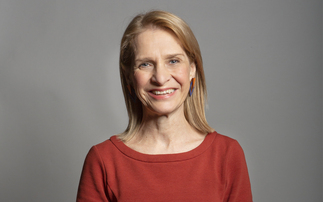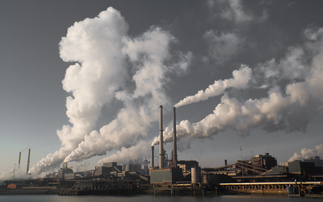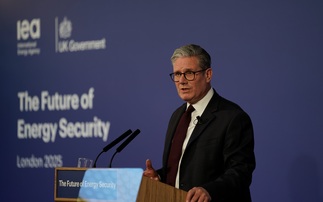The Prime Minister's speech may have secured plaudits for its delivery but on the biggest long term challenge and opportunity facing the UK she had nothing to say
There is a long and ignoble publishing tradition of books filled with blank pages, which serve as the droll punchline for the title. A few years back there were some competing blank-paged commentaries on US politics - Everything Obama Knows About the Economy and Why Trump Deserves, Trust, Respect, and Admiration - and we've also been treated to The Wit and Wisdom of Nigel Farage and What Every Man Thinks About Apart From Sex. In fact, the trend has become so well-established The Guardian was prompted to write a mournful editorial lamenting the blank page craze and all that it tells us about the death of satire.
With apologies to The Guardian, after yesterday's conference speech from Theresa May the temptation to accompany the above headline with a blank page is considerable.
Yes, it was by a distance her strongest speech to date. Yes, there was a coherent attempt to sketch out May's 'One Nation' Conservatism. Yes, there were some strong attack lines aimed at the opposition. And yes, the whole thing is likely to keep the leadership challengers at bay for another week or so, at least.
But a week after Jeremy Corbyn declared climate change was the biggest threat the world faced, May did not so much as utter the words. There were passing references to electric cars and the responsibility to conserve the planet for future generations, but that was it from an environmental perspective. Instead we got praise for expanding Heathrow and building more roads and a promise to freeze fuel duty for a ninth year running. There was not even the slightest nod to those who will be impacted by the air pollution and higher carbon emissions that will result.
The most frustrating thing is it did not have to be this way. Only a week ago May was in New York, where she again signalled the UK's support for climate action and signed up to an international push to promote net zero emission strategies. On the conference fringe, Michael Gove had put more flesh on the bones of his sweeping 'Green Brexit' vision. From action on plastic waste and electric vehicles to green jobs and the long-term need to build a net zero emissions economy, there are plenty of green issues May could have highlighted in support of her claims to act only in the national interest.
The case for doing so was also compelling. If commentators have broadly praised the delivery of May's speech they have also criticised the way in which her optimistic, migrant-praising, 'end to austerity' pitch was so detached from the reality of her own track record and the immense Brexit and economic challenges the government faces.
Her response to the UK's domestic difficulties - more freedom for councils to build houses, better cancer screening, a deferred promise to increase public spending - may have been welcome but it was in no way commensurate to the scale of the problems.
Even a brief section on the UK's booming offshore wind industry, its electric taxis, its plans to incentivise a greener approach to land management, would have been more effective at suggesting the government is interested in developing an economy for the 21st century. Better still some sort of plan for improving energy efficiency or tackling recent rising coal emissions or creating green jobs could have helped fill the policy void and given the vague promise to end austerity real purpose.
It should be obvious to CCHQ that Corbyn has evidently concluded that a bolder focus on green issues is a critical part of the opposition's pitch to the under 45s demographic that is turning its back on the Conservatives faster than you can say 'citizens of nowhere'.
The government will maintain it is still committed to a raft of environmental policies, that it is what you do, not what you say in a set piece speech that matters. Michael Gove was quick to tweet out his praise for a "fantastic speech". The deregulating Brexiters may have generated headlines, but there was also plenty of energy on the conference fringe in support of exciting new centre right-flavoured green policies.
It is a fair point, but equally politics is about priorities. In freezing fuel duty without announcing even modest new measures to address the higher emissions and air pollution that will result, May revealed where her priorities lay. In highlighting Heathrow and road-building as representative of the UK's industrial strategy and neglecting to mention offshore wind farms or electric vehicle factories, she further underlined her 20th century thinking.
This autumn will see the government presented with a series of opportunities to highlight the crucial importance of the green economy. Through the upcoming IPCC report, Green Great Britain Week, the 10th anniversary of the Climate Change Act, the Budget, and the crucial UN Summit in Poland, not to mention the more specific policy challenges and the promised review of net zero emission targets, the government will have to confirm how it sees the next phase of its decarbonisation plans playing out.
The Prime Minister could have set the direction and tone for these crucial months and provided her vision for a Green Great Britain that puts climate action at the heart of its post-Brexit economic strategy. Instead, she offered a blank page.
This post first appeared as part of BusinessGreen's Overnight Briefing email, which is available to all subscribers










